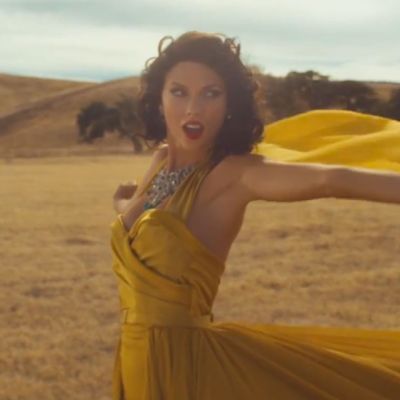
I am a black woman, and this week the internet says I should be angry because Taylor Swift’s “Wildest Dreams” video is set in an Africa full of white people. In it, director Joseph Kahn channels old Hollywood, with Swift and her co-star, Scott Eastwood, playing actors from the 1950s filming a movie on the African plains. The co-stars have an affair offscreen. There are exotic animals. When the actors return to the States for the premiere, it turns out one of them is already hitched. Hearts are broken. End scene. Oh, wait, sidebar, almost forgot — there are no black people.
After watching the video during its debut on the VMAs Sunday night, my initial thought was that it’s boring. It’s the visual equivalent of a harlequin novel on flibanserin. But then, like a stampede of zebras across the sunbaked savanna, the outrage started to roll in via headlines across the globe. Jezebel called it “a highly stylized, white-washed celebration of African colonialism.” NPR went further: “We are shocked to think that in 2015, Taylor Swift, her record label and her video production group would think it was OK to film a video that presents a glamorous version of the white colonial fantasy of Africa. Of course, this is not the first time that white people have romanticized colonialism: See Louis Vuitton’s 2014 campaign, Ernest Hemingway’s Snows of Kilimanjaro, the 1962 film Lawrence of Arabia and of course Karen Blixen’s memoir Out of Africa. But it still stings.”
Yikes. “Wildest Dreams” may be a bad video, but “The White Man’s Burden,” a poem by Rudyard Kipling that actually does glorify colonialism, it is not. Kahn’s oversight, for which he has issued a statement, is, at best, an inadvertent racial microaggression, one of those tiny but loaded infractions committed by individuals in positions of power. A single microaggression often goes unnoticed, but taken as a whole, they fill the cracks at the bedrock of our collective prejudice, making it stronger, more durable, and harder to dismantle.
Most of the time, these infractions are committed out of ignorance or naïveté, but microaggressions are everywhere, and it’s usually helpful to identify them. For example, say you get into a cab driven by a white driver. He asks you where you’re from. You say California. Then, looking at your burka, he says, “No, but where are you really from?” That’s a microagression. The appropriate response is to call out his ignorance and move on. Accusing Swift of romanticizing colonialism, as if deep down, in between singing totally meh pop songs about falling in and out of love, she’s been subconsciously harboring colonialist attitudes, is not one of these situations. Excluding black people in a video set in Africa was a shortsighted attempt at re-creating a very specific era and aesthetic. It was just bad judgment. That is all.
Remember, Swift was recently at the center of another racially charged controversy. It too, involved bad judgment, but unlike the “Wildest Dreams” row, it actually cut to the heart of a very real, very urgent debate about race and body-type discrimination in America today. Criticism of “Wildest Dreams” is centered on how the video glosses over an antiquated version of the horrors of colonialism in Africa. But modern-day colonialism in Africa still exists, and is far more important to discuss. (Watch Austrian director Hubert Sauper’s We Come As Friends for more perspective on this issue, not an exaggerated set piece loosely inspired by Elizabeth Taylor’s explosive relationship with Richard Burton. Just a suggestion.)
Thoughtful conversations about race on the internet are rare. Too often they’re used as an excuse not to deal with capital-R racism, or in this case, capital-C colonialism. Racists are very real. Colonialism is very real. But Taylor Swift is not a racist, and her “Wildest Dreams” video is not a boon for colonialism. Take a deep breath, exhale, and direct our rage toward something that matters.

